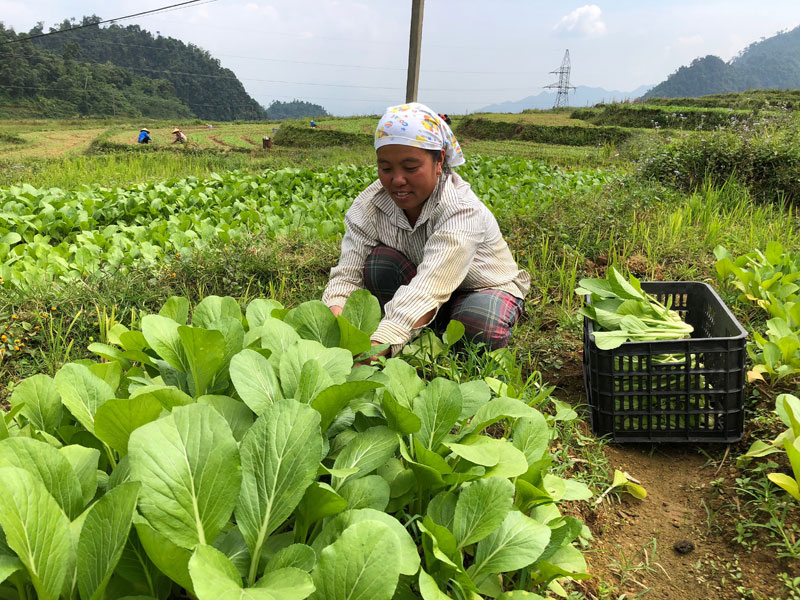
(HBO) - The fields in the villages of Tam Hoa, Bo Liem, and Bo Bau in Tan Son commune (Mai Chau) are being covered with green "cloth”.

Members of Tam Hoa agricultural service and
development cooperative are harvesting VietGAP vegetables in Tan Son commune
(Mai Chau).
The model of linking the production and
consumption of safe and qualified vegetables was selected for implementation by
the Board of Quality Management of Agriculture, Forestry and Fishery in Tan Son
Commune since July, 2018. After the time of selecting households to participate in training, technical guidance
on planting according to the VietGAP process, Tam Hoa agricultural service and
development cooperative is responsible for collecting and selling products for
farmers. Mr. Ha Van Quynh, Director of Tam Hoa Agricultural Service and
Development Cooperative said that in August, the vegetable seeds of some
households were affected and damaged by natural disasters, but thanks to the
guidance timely and timely encouragement of the staff of the Board of Quality
Assurance of agricultural, forestry and fishery products in charge of the
model, the households started to re-produce immediately after the rainstorm
stopped. The cultivation was carried out in accordance with the process, season
and method of mixed planting method,
planted scattered to make regular harvest, avoid the mass plantation, leading
to excess products and falling prices. Up to now, 3 villages have created the
concentrated production areas. After the first planting with an area of 2
hectares, the households continue to expand the area to 10 hectares. The
Cooperative pledges to ensure that the whole output for farmers is stable at
6,000 VND / kg, higher than 2,000 VND / kg compared to the free market.
Dao Village’s honey – a product certified with a 3-star OCOP (One Commune One Product) rating by Thong Nhat Agricultural Cooperative in Dao Village (Hoa Binh City) – is highly regarded by consumers for its quality, richness, and variety in packaging. The distinctively sweet taste of Dao Village’s honey leaves a lasting impression on anyone who has tried it.
In alignment with Project No. 07-DA/TU, issued by the Hoa Binh provincial Party Committee on November 1, 2021, Lac Thuy district has actively promoted investment and supported the sustainable development of its industrial and handicraft sectors during the 2021–2025 period. Alongside this, the district has remained committed to preserving and revitalising traditional craft villages.
Located in the northern part of Lac Thuy district, with a temperate climate and fertile soil, Phu Thanh commune has great potential and advantages in growing tea. The long-standing experience, combined with strict adherence to organic farming practices in the tea gardens, ensures that the dried tea products from Phu Thanh and Lac Thuy as a whole are sold out immediately upon production, providing a stable and prosperous life for the local people.
Amid efforts to streamline the administrative apparatus, Hoa Binh province has intensified measures to address challenges in land clearance, resettlement support, and infrastructure investment, aiming to speed up the progress of key projects.
Hoa Binh province has posted an unprecedented economic growth rate of 12.76% in the first quarter of 2025, marking its highest quarterly performance to date and positioning it as the second fastest-growing locality in the country, trailing only Bac Giang province.
Under current regulations, products in the One Commune – One Product (OCOP) programme that are rated three stars or higher must undergo re-evaluation every three months. However, in reality, some of these products fail to consistently meet the required standards, raising concerns about the sustainability of their OCOP certification. This underscores the urgent need for producers to enhance product quality and gradually develop their OCOP products into strong, marketable brands.



